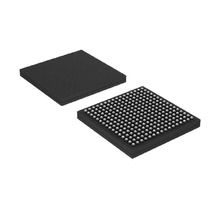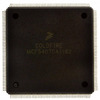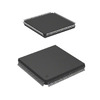Manufacturer Part Number
MCF54418CMJ250
Manufacturer
NXP Semiconductors
Introduction
The MCF54418CMJ250 is a 32-bit single-core microcontroller from NXP Semiconductors' MCF5441x series, designed for embedded applications requiring high performance and a variety of connectivity options.
Product Features and Performance
Core Processor: Coldfire V4
Core Size: 32-Bit Single-Core
Speed: 250MHz
Connectivity: 1-Wire, CANbus, EBI/EMI, Ethernet, I2C, SmartCard, SPI, SSI, UART/USART, USB, USB OTG
Peripherals: DMA, PWM, WDT
Number of I/O: 87
Program Memory Type: ROMless
RAM Size: 64K x 8
Data Converters: A/D 8x12b, D/A 2x12b
Oscillator Type: Internal
Operating Temperature: -40°C ~ 85°C (TA)
Product Advantages
High-speed performance at 250MHz
Extensive connectivity options covering major communication protocols
Includes a variety of peripherals to enhance functionality
Operates across a wide temperature range, suitable for harsh environments
Large number of I/O pins for complex applications
Key Technical Parameters
Voltage - Supply (Vcc/Vdd): 1.14V ~ 1.32V
Mounting Type: Surface Mount
Supplier Device Package: 256-MAPBGA (17x17)
Package / Case: 256-LBGA
Base Product Number: MCF54418
Quality and Safety Features
Designed for operation in industrial temperature ranges
Built-in safety features like Watchdog Timer (WDT)
Compatibility
Compatible with various communication standards including CAN, Ethernet, I2C, and USB
Supports a wide range of external devices through its numerous I/Os
Application Areas
Industrial control systems
Networking equipment
Automotive applications
Medical devices
Complex embedded systems
Product Lifecycle
Product Status: Active
No immediate risk of discontinuation, replacements or upgrades available if necessary
Key Reasons to Choose This Product
Robust processing capabilities with Coldfire V4 32-Bit Single-Core at 250MHz
Expansive communication interface suite suitable for versatile applications
Supports a wide operational temperature range, essential for demanding environments
ROMless feature allows for flexibility in the program memory configuration
Significant peripheral integration to minimize additional component needs, reducing system complexity and cost



 MCF54452VR266NXP USA Inc.IC MCU 32BIT ROMLESS 360TEPBGA
MCF54452VR266NXP USA Inc.IC MCU 32BIT ROMLESS 360TEPBGA MCF5407CFT220MotorolaMPU COLDFIRE MCF5XXX PROCESSOR R
MCF5407CFT220MotorolaMPU COLDFIRE MCF5XXX PROCESSOR R MCF5407CAI220Freescale SemiconductorIC MCU 32BIT ROMLESS 208FQFP
MCF5407CAI220Freescale SemiconductorIC MCU 32BIT ROMLESS 208FQFP